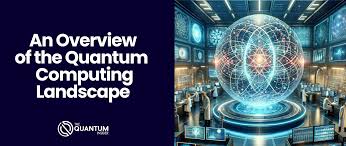
AI Breakthrough in Quantum Computing
Introduction
AI Breakthrough in Quantum Computing; Artificial Intelligence (AI) and quantum computing are two of the most transformative technologies of the 21st century.
Separately, they offer remarkable potential for solving complex problems, but when combined, their capabilities are amplified significantly.
AI benefits from advanced computational resources, while quantum computing thrives on the efficient handling of vast datasets and intricate problem-solving — areas where AI excels.
This intersection has paved the way for groundbreaking innovations, reshaping industries ranging from healthcare and finance to cryptography and material science.
READ THIS ARTICLE ALSO: Overview of PyPI and its Role in the Developer Ecosystem
In this detailed exploration, we will unpack the synergy between AI and quantum computing, delve into the latest breakthroughs, and examine their implications for the future.
The Synergy of AI and Quantum Computing
To understand the potential of this fusion, it is crucial to grasp their individual strengths:
- Artificial Intelligence: AI encompasses machine learning, natural language processing, and neural networks that mimic human cognitive functions. Its efficiency in pattern recognition and predictive modeling has made it indispensable across sectors.
- Quantum Computing: Quantum computers leverage quantum mechanics, utilizing phenomena such as superposition and entanglement to process information. Unlike classical computers, which use binary states (0 and 1), quantum computers can represent multiple states simultaneously, allowing for exponential increases in processing power.
AI Breakthrough in Quantum Computing; The convergence of these two technologies is not just additive; it is synergistic. AI algorithms can optimize quantum computations by determining ideal parameters and correcting errors. Conversely, quantum computers can accelerate AI tasks like training neural networks or solving combinatorial optimization problems.
Recent Breakthroughs in AI Computing.
The fusion of AI and quantum computing has yielded several groundbreaking developments:
- Quantum-Assisted Machine Learning (QAML):
- Researchers are using quantum computing to enhance the training of AI models. By leveraging quantum algorithms like the Variational Quantum Eigensolver (VQE) and Quantum Approximate Optimization Algorithm (QAOA), tasks that would take classical computers weeks can now be accomplished in hours.
- Example: Google’s Quantum AI lab demonstrated the use of quantum computers to perform calculations for machine learning models, achieving speeds unattainable with classical methods.
- Quantum Neural Networks (QNNs):
- Quantum neural networks are a hybrid approach where classical AI models integrate quantum circuits. This allows for faster training and inference, especially for high-dimensional datasets.
- Example: IBM developed QNNs that outperform traditional neural networks in solving specific optimization problems, such as portfolio management and supply chain logistics.
- Error Correction with AI:
- One of the major challenges in quantum computing is error correction due to the fragile nature of qubits. AI-driven algorithms are being used to predict and correct quantum errors in real time.
- Example: AI-powered error mitigation methods developed by Microsoft have increased the reliability of quantum computations.
- AI for Quantum Hardware Optimization:
- Quantum computers require precise hardware configurations, from qubit arrangement to temperature control. AI algorithms optimize these configurations, ensuring maximum efficiency.
- Example: Rigetti Computing uses AI to enhance the calibration of its quantum processors, significantly improving their performance and stability.
- Quantum Speedup in AI Training:
- AI training is computationally intensive, often requiring massive datasets and significant processing time. Quantum computers have demonstrated “quantum speedup,” dramatically reducing the time required for training.
- Example: A study by the University of Waterloo showed that quantum computers could train a machine learning model 10 times faster than classical methods.
Implications Across Industries
The marriage of AI and quantum computing is poised to revolutionize several industries:
- Healthcare:
- Drug Discovery: Quantum computing accelerates the simulation of molecular interactions, while AI identifies promising compounds. Together, they shorten drug discovery timelines from years to months.
- Personalized Medicine: AI models powered by quantum computing can analyze patient data to tailor treatments at an unprecedented scale.
- Finance:
- Risk Assessment: Quantum algorithms enhance AI models for risk analysis, providing more accurate predictions for market fluctuations.
- Fraud Detection: AI-driven quantum systems can process vast transaction datasets in real time to detect anomalies and prevent fraud.
- Cryptography:
- Quantum-Safe Encryption: While quantum computers threaten traditional encryption, AI is being used to develop quantum-resistant algorithms.
- Cryptanalysis: AI-augmented quantum computers can analyze complex cryptographic systems, aiding in their improvement.
- Material Science:
- Quantum computing accelerates the discovery of new materials, while AI predicts their properties and applications. This is particularly impactful for creating sustainable energy solutions.
- Logistics and Supply Chain:
- AI and quantum computing optimize complex logistics networks, reducing costs and improving efficiency in transportation and inventory management.READ THIS ALSO: Research on SSH: The Rule that Secures Remote Network Access
Challenges and Limitations
Despite the promising advancements, several challenges must be addressed:
- Scalability:
- Quantum computers are still in their infancy, with limited qubit counts. Scaling these systems to support large-scale AI applications remains a hurdle.
- Error Rates:
- Qubits are highly sensitive to environmental disturbances, leading to errors. While AI helps mitigate this, achieving fault-tolerant quantum computing is a significant challenge.
- Accessibility:
- Quantum computing is resource-intensive, making it accessible primarily to large corporations and research institutions. Democratizing this technology is critical for broader adoption.
- Integration with Classical Systems:
- Bridging the gap between classical and quantum systems requires sophisticated hybrid models, which are complex to develop and implement
- Scalability:
- AI and quantum computing optimize complex logistics networks, reducing costs and improving efficiency in transportation and inventory management.READ THIS ALSO: Research on SSH: The Rule that Secures Remote Network Access
Future Outlook in AI Computing
The integration of AI and quantum computing is still in its early stages, but the trajectory is clear. Experts predict that within the next decade:
- Commercialization:
- Quantum computing will move from research labs to commercial applications, with AI playing a central role in its deployment.
- AI-Driven Quantum Algorithms:
- As AI becomes more adept at understanding quantum mechanics, it will design and optimize quantum algorithms, accelerating progress across fields.
- Enhanced Collaboration:
- Partnerships between tech giants, startups, and academia will drive innovation. Open-source initiatives will also play a crucial role in democratizing access.
- New Paradigms in Learning:
- The development of quantum-native AI models will create entirely new paradigms for machine learning, breaking the limitations of classical approaches.
Ethics and Societal reforms
Responsibility comes with great power. The convergence of AI and quantum computing raises ethical questions:
- Security Risks:
- The ability to break traditional encryption poses a significant threat to data security. Developing quantum-safe protocols is essential.
- Bias and Fairness:
- AI models trained on biased data can produce inequitable outcomes. Quantum speedup may amplify these biases if not addressed.
- Job Displacement:
- Automation driven by AI-quantum systems could disrupt job markets. Policies must be in place to manage this transition and ensure equitable opportunities.
- Global Inequality:
- The high cost of quantum technology risks exacerbating the divide between developed and developing nations.
Conclusion
AI Breakthrough in Quantum Computing; The convergence of AI and quantum computing represents a monumental leap forward, unlocking possibilities that were once confined to the realm of science fiction. From revolutionizing industries to addressing some of humanity’s greatest challenges, the potential of these technologies is boundless.
However, realizing this potential requires a concerted effort to overcome technical, ethical, and societal challenges.As we stand on the cusp of this new frontier, collaboration, innovation, and foresight will be essential in shaping a future where AI and quantum computing work harmoniously to benefit all of humanity. The breakthroughs we witness today are just the beginning of an era defined by unprecedented computational power and intelligence.
- Healthcare:


